Conflict Resolution Strategies in Group Work Setting: A Case Study
VerifiedAdded on 2023/06/05
|5
|2002
|402
AI Summary
This case study explores conflict resolution strategies in a group work setting. It covers identifying suitable strategies, involving participants, communication strategies, supporting participants, and positive conflict. The scenario involves a parenting skills group targeted at parents who do not presently have their children in their care. During week 4 of the group, conflict arises between two participants, leading to heated discussions and discomfort among other participants.
Contribute Materials
Your contribution can guide someone’s learning journey. Share your
documents today.
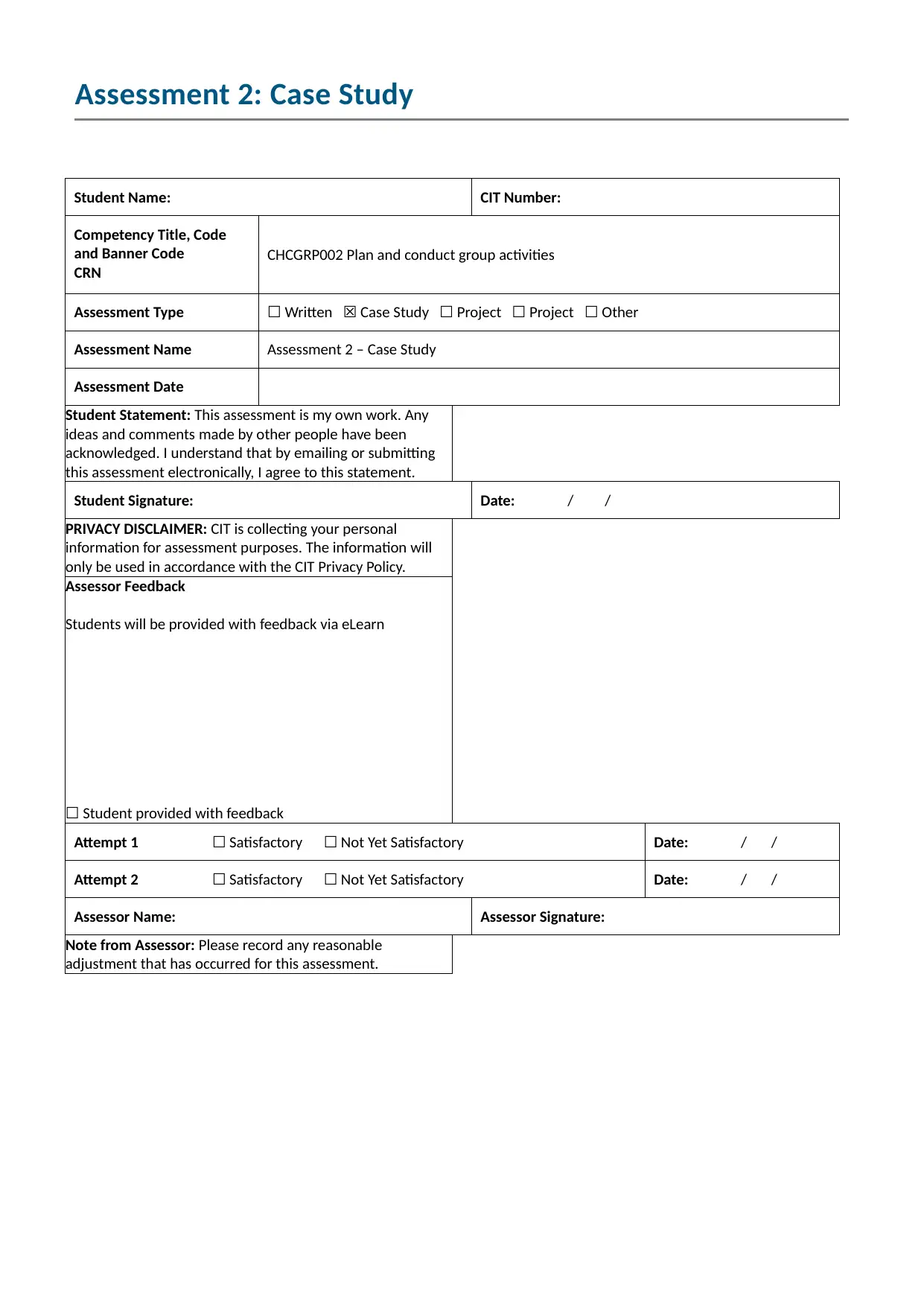
Assessment 2: Case Study
Student Name: CIT Number:
Competency Title, Code
and Banner Code
CRN
CHCGRP002 Plan and conduct group activities
Assessment Type ☐ Written ☒ Case Study ☐ Project ☐ Project ☐ Other
Assessment Name Assessment 2 – Case Study
Assessment Date
Student Statement: This assessment is my own work. Any
ideas and comments made by other people have been
acknowledged. I understand that by emailing or submitting
this assessment electronically, I agree to this statement.
Student Signature: Date: / /
PRIVACY DISCLAIMER: CIT is collecting your personal
information for assessment purposes. The information will
only be used in accordance with the CIT Privacy Policy.
Assessor Feedback
Students will be provided with feedback via eLearn
☐ Student provided with feedback
Attempt 1 ☐ Satisfactory ☐ Not Yet Satisfactory Date: / /
Attempt 2 ☐ Satisfactory ☐ Not Yet Satisfactory Date: / /
Assessor Name: Assessor Signature:
Note from Assessor: Please record any reasonable
adjustment that has occurred for this assessment.
Student Name: CIT Number:
Competency Title, Code
and Banner Code
CRN
CHCGRP002 Plan and conduct group activities
Assessment Type ☐ Written ☒ Case Study ☐ Project ☐ Project ☐ Other
Assessment Name Assessment 2 – Case Study
Assessment Date
Student Statement: This assessment is my own work. Any
ideas and comments made by other people have been
acknowledged. I understand that by emailing or submitting
this assessment electronically, I agree to this statement.
Student Signature: Date: / /
PRIVACY DISCLAIMER: CIT is collecting your personal
information for assessment purposes. The information will
only be used in accordance with the CIT Privacy Policy.
Assessor Feedback
Students will be provided with feedback via eLearn
☐ Student provided with feedback
Attempt 1 ☐ Satisfactory ☐ Not Yet Satisfactory Date: / /
Attempt 2 ☐ Satisfactory ☐ Not Yet Satisfactory Date: / /
Assessor Name: Assessor Signature:
Note from Assessor: Please record any reasonable
adjustment that has occurred for this assessment.
Secure Best Marks with AI Grader
Need help grading? Try our AI Grader for instant feedback on your assignments.
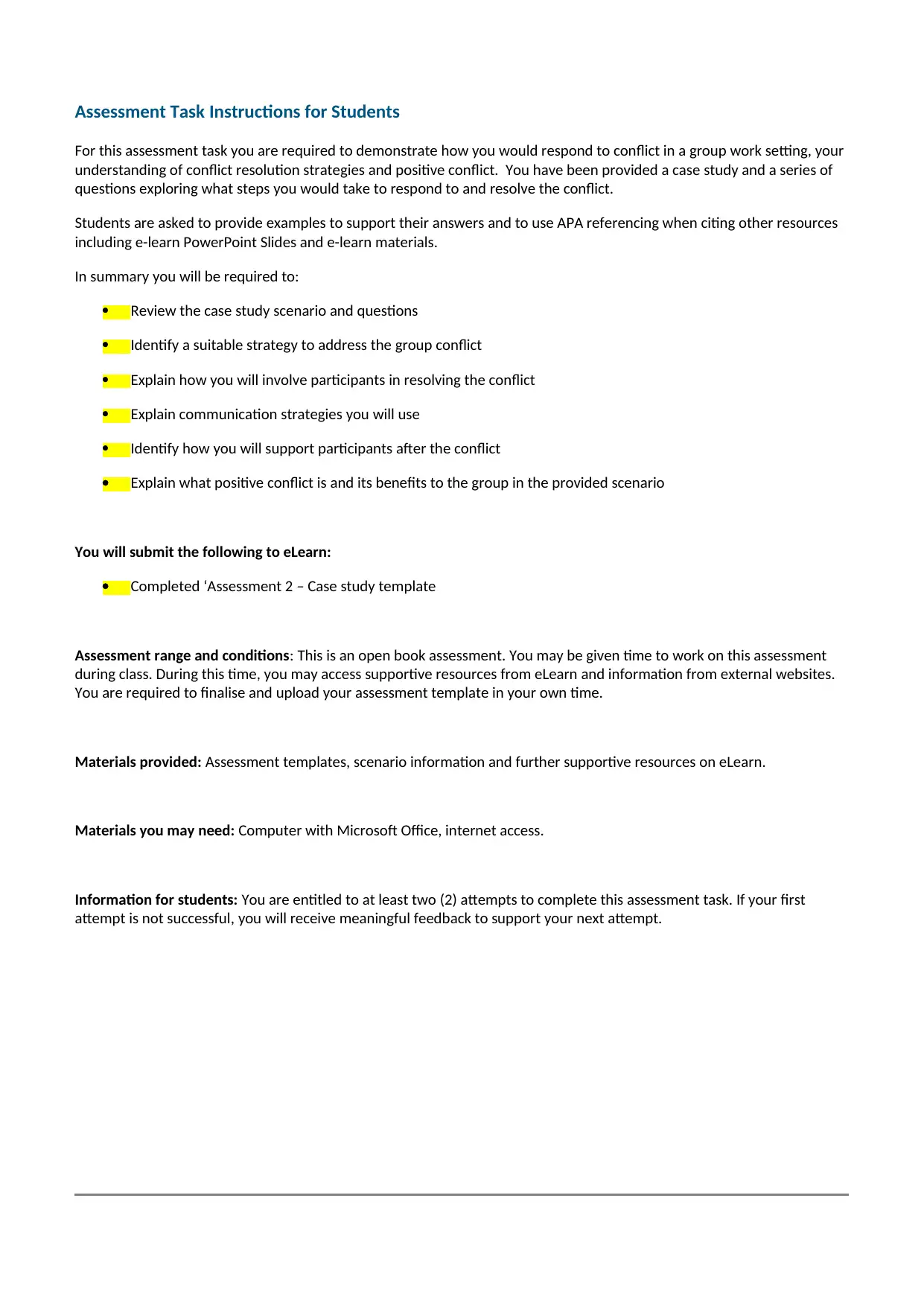
Assessment Task Instructions for Students
For this assessment task you are required to demonstrate how you would respond to conflict in a group work setting, your
understanding of conflict resolution strategies and positive conflict. You have been provided a case study and a series of
questions exploring what steps you would take to respond to and resolve the conflict.
Students are asked to provide examples to support their answers and to use APA referencing when citing other resources
including e-learn PowerPoint Slides and e-learn materials.
In summary you will be required to:
Review the case study scenario and questions
Identify a suitable strategy to address the group conflict
Explain how you will involve participants in resolving the conflict
Explain communication strategies you will use
Identify how you will support participants after the conflict
Explain what positive conflict is and its benefits to the group in the provided scenario
You will submit the following to eLearn:
Completed ‘Assessment 2 – Case study template
Assessment range and conditions: This is an open book assessment. You may be given time to work on this assessment
during class. During this time, you may access supportive resources from eLearn and information from external websites.
You are required to finalise and upload your assessment template in your own time.
Materials provided: Assessment templates, scenario information and further supportive resources on eLearn.
Materials you may need: Computer with Microsoft Office, internet access.
Information for students: You are entitled to at least two (2) attempts to complete this assessment task. If your first
attempt is not successful, you will receive meaningful feedback to support your next attempt.
For this assessment task you are required to demonstrate how you would respond to conflict in a group work setting, your
understanding of conflict resolution strategies and positive conflict. You have been provided a case study and a series of
questions exploring what steps you would take to respond to and resolve the conflict.
Students are asked to provide examples to support their answers and to use APA referencing when citing other resources
including e-learn PowerPoint Slides and e-learn materials.
In summary you will be required to:
Review the case study scenario and questions
Identify a suitable strategy to address the group conflict
Explain how you will involve participants in resolving the conflict
Explain communication strategies you will use
Identify how you will support participants after the conflict
Explain what positive conflict is and its benefits to the group in the provided scenario
You will submit the following to eLearn:
Completed ‘Assessment 2 – Case study template
Assessment range and conditions: This is an open book assessment. You may be given time to work on this assessment
during class. During this time, you may access supportive resources from eLearn and information from external websites.
You are required to finalise and upload your assessment template in your own time.
Materials provided: Assessment templates, scenario information and further supportive resources on eLearn.
Materials you may need: Computer with Microsoft Office, internet access.
Information for students: You are entitled to at least two (2) attempts to complete this assessment task. If your first
attempt is not successful, you will receive meaningful feedback to support your next attempt.
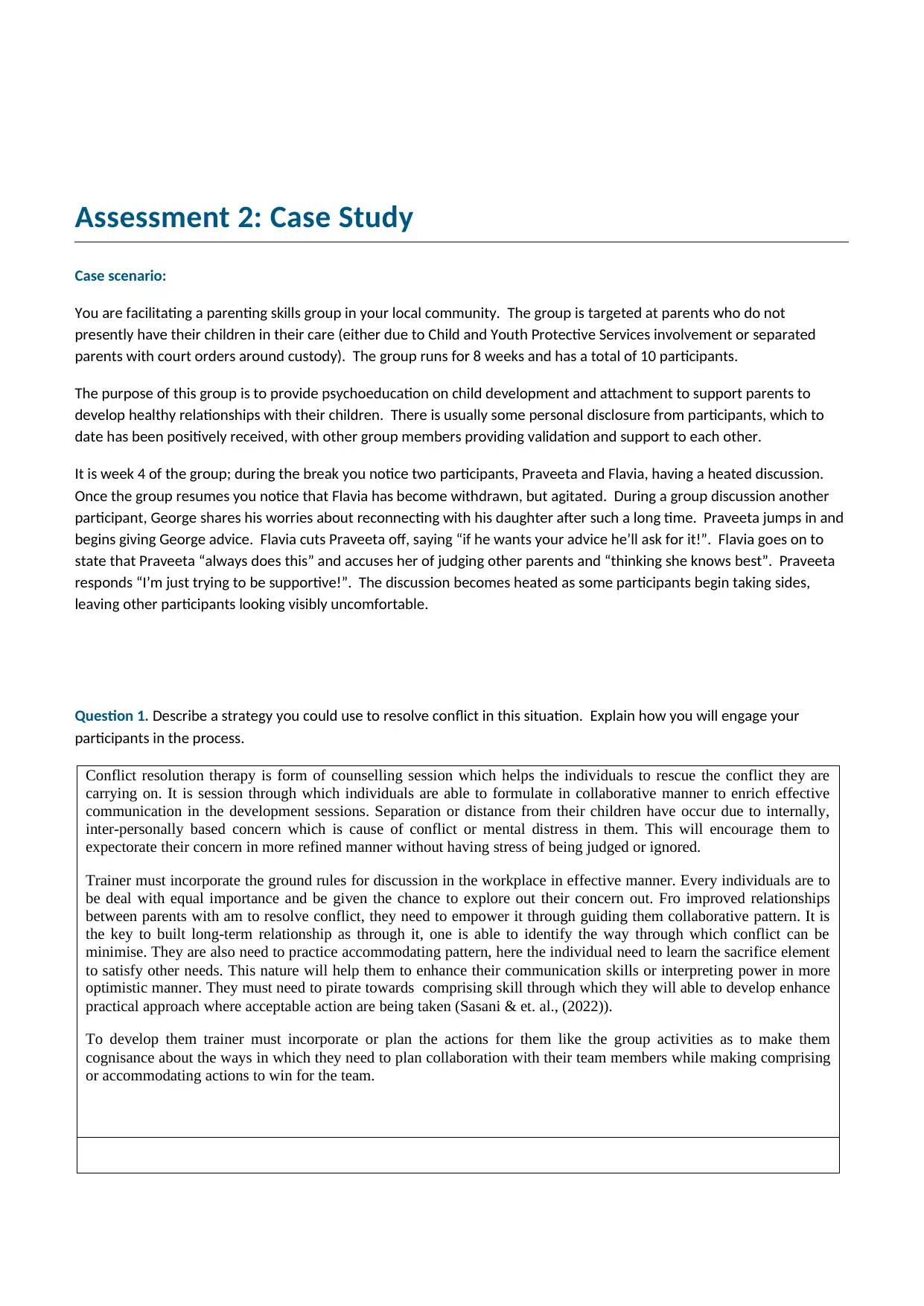
Assessment 2: Case Study
Case scenario:
You are facilitating a parenting skills group in your local community. The group is targeted at parents who do not
presently have their children in their care (either due to Child and Youth Protective Services involvement or separated
parents with court orders around custody). The group runs for 8 weeks and has a total of 10 participants.
The purpose of this group is to provide psychoeducation on child development and attachment to support parents to
develop healthy relationships with their children. There is usually some personal disclosure from participants, which to
date has been positively received, with other group members providing validation and support to each other.
It is week 4 of the group; during the break you notice two participants, Praveeta and Flavia, having a heated discussion.
Once the group resumes you notice that Flavia has become withdrawn, but agitated. During a group discussion another
participant, George shares his worries about reconnecting with his daughter after such a long time. Praveeta jumps in and
begins giving George advice. Flavia cuts Praveeta off, saying “if he wants your advice he’ll ask for it!”. Flavia goes on to
state that Praveeta “always does this” and accuses her of judging other parents and “thinking she knows best”. Praveeta
responds “I’m just trying to be supportive!”. The discussion becomes heated as some participants begin taking sides,
leaving other participants looking visibly uncomfortable.
Question 1. Describe a strategy you could use to resolve conflict in this situation. Explain how you will engage your
participants in the process.
Conflict resolution therapy is form of counselling session which helps the individuals to rescue the conflict they are
carrying on. It is session through which individuals are able to formulate in collaborative manner to enrich effective
communication in the development sessions. Separation or distance from their children have occur due to internally,
inter-personally based concern which is cause of conflict or mental distress in them. This will encourage them to
expectorate their concern in more refined manner without having stress of being judged or ignored.
Trainer must incorporate the ground rules for discussion in the workplace in effective manner. Every individuals are to
be deal with equal importance and be given the chance to explore out their concern out. Fro improved relationships
between parents with am to resolve conflict, they need to empower it through guiding them collaborative pattern. It is
the key to built long-term relationship as through it, one is able to identify the way through which conflict can be
minimise. They are also need to practice accommodating pattern, here the individual need to learn the sacrifice element
to satisfy other needs. This nature will help them to enhance their communication skills or interpreting power in more
optimistic manner. They must need to pirate towards comprising skill through which they will able to develop enhance
practical approach where acceptable action are being taken (Sasani & et. al., (2022)).
To develop them trainer must incorporate or plan the actions for them like the group activities as to make them
cognisance about the ways in which they need to plan collaboration with their team members while making comprising
or accommodating actions to win for the team.
Case scenario:
You are facilitating a parenting skills group in your local community. The group is targeted at parents who do not
presently have their children in their care (either due to Child and Youth Protective Services involvement or separated
parents with court orders around custody). The group runs for 8 weeks and has a total of 10 participants.
The purpose of this group is to provide psychoeducation on child development and attachment to support parents to
develop healthy relationships with their children. There is usually some personal disclosure from participants, which to
date has been positively received, with other group members providing validation and support to each other.
It is week 4 of the group; during the break you notice two participants, Praveeta and Flavia, having a heated discussion.
Once the group resumes you notice that Flavia has become withdrawn, but agitated. During a group discussion another
participant, George shares his worries about reconnecting with his daughter after such a long time. Praveeta jumps in and
begins giving George advice. Flavia cuts Praveeta off, saying “if he wants your advice he’ll ask for it!”. Flavia goes on to
state that Praveeta “always does this” and accuses her of judging other parents and “thinking she knows best”. Praveeta
responds “I’m just trying to be supportive!”. The discussion becomes heated as some participants begin taking sides,
leaving other participants looking visibly uncomfortable.
Question 1. Describe a strategy you could use to resolve conflict in this situation. Explain how you will engage your
participants in the process.
Conflict resolution therapy is form of counselling session which helps the individuals to rescue the conflict they are
carrying on. It is session through which individuals are able to formulate in collaborative manner to enrich effective
communication in the development sessions. Separation or distance from their children have occur due to internally,
inter-personally based concern which is cause of conflict or mental distress in them. This will encourage them to
expectorate their concern in more refined manner without having stress of being judged or ignored.
Trainer must incorporate the ground rules for discussion in the workplace in effective manner. Every individuals are to
be deal with equal importance and be given the chance to explore out their concern out. Fro improved relationships
between parents with am to resolve conflict, they need to empower it through guiding them collaborative pattern. It is
the key to built long-term relationship as through it, one is able to identify the way through which conflict can be
minimise. They are also need to practice accommodating pattern, here the individual need to learn the sacrifice element
to satisfy other needs. This nature will help them to enhance their communication skills or interpreting power in more
optimistic manner. They must need to pirate towards comprising skill through which they will able to develop enhance
practical approach where acceptable action are being taken (Sasani & et. al., (2022)).
To develop them trainer must incorporate or plan the actions for them like the group activities as to make them
cognisance about the ways in which they need to plan collaboration with their team members while making comprising
or accommodating actions to win for the team.
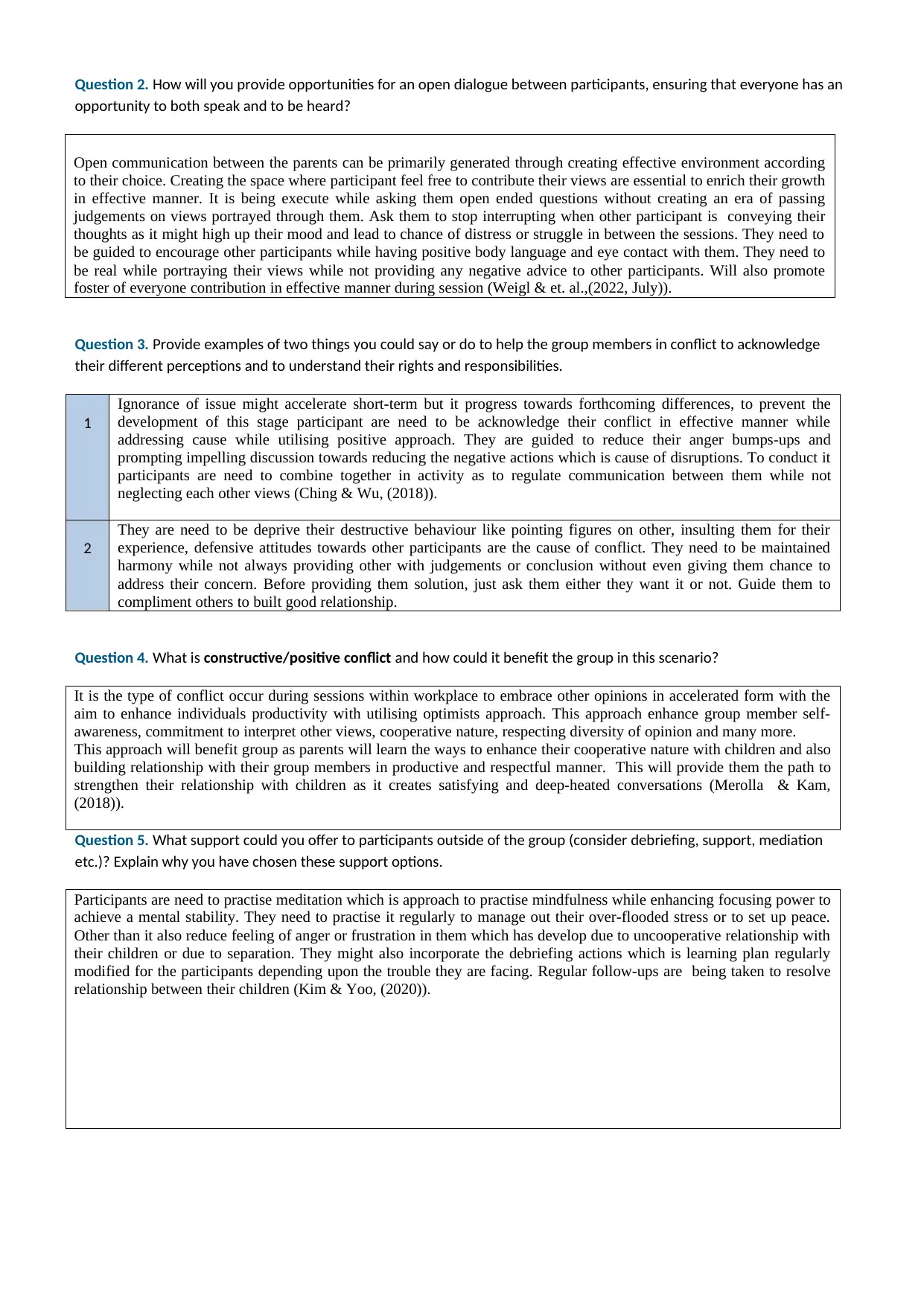
Question 2. How will you provide opportunities for an open dialogue between participants, ensuring that everyone has an
opportunity to both speak and to be heard?
Open communication between the parents can be primarily generated through creating effective environment according
to their choice. Creating the space where participant feel free to contribute their views are essential to enrich their growth
in effective manner. It is being execute while asking them open ended questions without creating an era of passing
judgements on views portrayed through them. Ask them to stop interrupting when other participant is conveying their
thoughts as it might high up their mood and lead to chance of distress or struggle in between the sessions. They need to
be guided to encourage other participants while having positive body language and eye contact with them. They need to
be real while portraying their views while not providing any negative advice to other participants. Will also promote
foster of everyone contribution in effective manner during session (Weigl & et. al.,(2022, July)).
Question 3. Provide examples of two things you could say or do to help the group members in conflict to acknowledge
their different perceptions and to understand their rights and responsibilities.
1
Ignorance of issue might accelerate short-term but it progress towards forthcoming differences, to prevent the
development of this stage participant are need to be acknowledge their conflict in effective manner while
addressing cause while utilising positive approach. They are guided to reduce their anger bumps-ups and
prompting impelling discussion towards reducing the negative actions which is cause of disruptions. To conduct it
participants are need to combine together in activity as to regulate communication between them while not
neglecting each other views (Ching & Wu, (2018)).
2
They are need to be deprive their destructive behaviour like pointing figures on other, insulting them for their
experience, defensive attitudes towards other participants are the cause of conflict. They need to be maintained
harmony while not always providing other with judgements or conclusion without even giving them chance to
address their concern. Before providing them solution, just ask them either they want it or not. Guide them to
compliment others to built good relationship.
Question 4. What is constructive/positive conflict and how could it benefit the group in this scenario?
It is the type of conflict occur during sessions within workplace to embrace other opinions in accelerated form with the
aim to enhance individuals productivity with utilising optimists approach. This approach enhance group member self-
awareness, commitment to interpret other views, cooperative nature, respecting diversity of opinion and many more.
This approach will benefit group as parents will learn the ways to enhance their cooperative nature with children and also
building relationship with their group members in productive and respectful manner. This will provide them the path to
strengthen their relationship with children as it creates satisfying and deep-heated conversations (Merolla & Kam,
(2018)).
Question 5. What support could you offer to participants outside of the group (consider debriefing, support, mediation
etc.)? Explain why you have chosen these support options.
Participants are need to practise meditation which is approach to practise mindfulness while enhancing focusing power to
achieve a mental stability. They need to practise it regularly to manage out their over-flooded stress or to set up peace.
Other than it also reduce feeling of anger or frustration in them which has develop due to uncooperative relationship with
their children or due to separation. They might also incorporate the debriefing actions which is learning plan regularly
modified for the participants depending upon the trouble they are facing. Regular follow-ups are being taken to resolve
relationship between their children (Kim & Yoo, (2020)).
opportunity to both speak and to be heard?
Open communication between the parents can be primarily generated through creating effective environment according
to their choice. Creating the space where participant feel free to contribute their views are essential to enrich their growth
in effective manner. It is being execute while asking them open ended questions without creating an era of passing
judgements on views portrayed through them. Ask them to stop interrupting when other participant is conveying their
thoughts as it might high up their mood and lead to chance of distress or struggle in between the sessions. They need to
be guided to encourage other participants while having positive body language and eye contact with them. They need to
be real while portraying their views while not providing any negative advice to other participants. Will also promote
foster of everyone contribution in effective manner during session (Weigl & et. al.,(2022, July)).
Question 3. Provide examples of two things you could say or do to help the group members in conflict to acknowledge
their different perceptions and to understand their rights and responsibilities.
1
Ignorance of issue might accelerate short-term but it progress towards forthcoming differences, to prevent the
development of this stage participant are need to be acknowledge their conflict in effective manner while
addressing cause while utilising positive approach. They are guided to reduce their anger bumps-ups and
prompting impelling discussion towards reducing the negative actions which is cause of disruptions. To conduct it
participants are need to combine together in activity as to regulate communication between them while not
neglecting each other views (Ching & Wu, (2018)).
2
They are need to be deprive their destructive behaviour like pointing figures on other, insulting them for their
experience, defensive attitudes towards other participants are the cause of conflict. They need to be maintained
harmony while not always providing other with judgements or conclusion without even giving them chance to
address their concern. Before providing them solution, just ask them either they want it or not. Guide them to
compliment others to built good relationship.
Question 4. What is constructive/positive conflict and how could it benefit the group in this scenario?
It is the type of conflict occur during sessions within workplace to embrace other opinions in accelerated form with the
aim to enhance individuals productivity with utilising optimists approach. This approach enhance group member self-
awareness, commitment to interpret other views, cooperative nature, respecting diversity of opinion and many more.
This approach will benefit group as parents will learn the ways to enhance their cooperative nature with children and also
building relationship with their group members in productive and respectful manner. This will provide them the path to
strengthen their relationship with children as it creates satisfying and deep-heated conversations (Merolla & Kam,
(2018)).
Question 5. What support could you offer to participants outside of the group (consider debriefing, support, mediation
etc.)? Explain why you have chosen these support options.
Participants are need to practise meditation which is approach to practise mindfulness while enhancing focusing power to
achieve a mental stability. They need to practise it regularly to manage out their over-flooded stress or to set up peace.
Other than it also reduce feeling of anger or frustration in them which has develop due to uncooperative relationship with
their children or due to separation. They might also incorporate the debriefing actions which is learning plan regularly
modified for the participants depending upon the trouble they are facing. Regular follow-ups are being taken to resolve
relationship between their children (Kim & Yoo, (2020)).
Secure Best Marks with AI Grader
Need help grading? Try our AI Grader for instant feedback on your assignments.
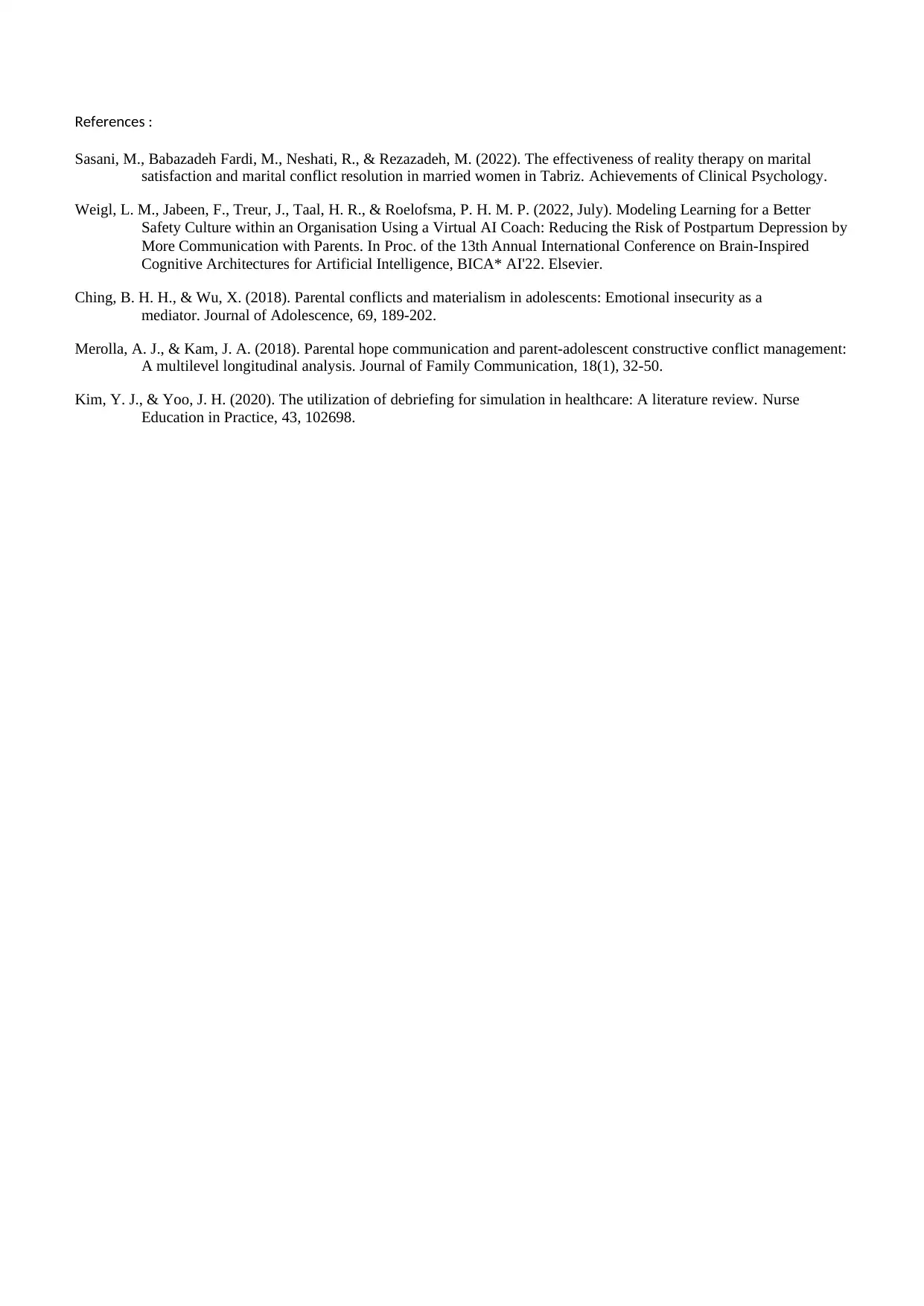
References :
Sasani, M., Babazadeh Fardi, M., Neshati, R., & Rezazadeh, M. (2022). The effectiveness of reality therapy on marital
satisfaction and marital conflict resolution in married women in Tabriz. Achievements of Clinical Psychology.
Weigl, L. M., Jabeen, F., Treur, J., Taal, H. R., & Roelofsma, P. H. M. P. (2022, July). Modeling Learning for a Better
Safety Culture within an Organisation Using a Virtual AI Coach: Reducing the Risk of Postpartum Depression by
More Communication with Parents. In Proc. of the 13th Annual International Conference on Brain-Inspired
Cognitive Architectures for Artificial Intelligence, BICA* AI'22. Elsevier.
Ching, B. H. H., & Wu, X. (2018). Parental conflicts and materialism in adolescents: Emotional insecurity as a
mediator. Journal of Adolescence, 69, 189-202.
Merolla, A. J., & Kam, J. A. (2018). Parental hope communication and parent-adolescent constructive conflict management:
A multilevel longitudinal analysis. Journal of Family Communication, 18(1), 32-50.
Kim, Y. J., & Yoo, J. H. (2020). The utilization of debriefing for simulation in healthcare: A literature review. Nurse
Education in Practice, 43, 102698.
Sasani, M., Babazadeh Fardi, M., Neshati, R., & Rezazadeh, M. (2022). The effectiveness of reality therapy on marital
satisfaction and marital conflict resolution in married women in Tabriz. Achievements of Clinical Psychology.
Weigl, L. M., Jabeen, F., Treur, J., Taal, H. R., & Roelofsma, P. H. M. P. (2022, July). Modeling Learning for a Better
Safety Culture within an Organisation Using a Virtual AI Coach: Reducing the Risk of Postpartum Depression by
More Communication with Parents. In Proc. of the 13th Annual International Conference on Brain-Inspired
Cognitive Architectures for Artificial Intelligence, BICA* AI'22. Elsevier.
Ching, B. H. H., & Wu, X. (2018). Parental conflicts and materialism in adolescents: Emotional insecurity as a
mediator. Journal of Adolescence, 69, 189-202.
Merolla, A. J., & Kam, J. A. (2018). Parental hope communication and parent-adolescent constructive conflict management:
A multilevel longitudinal analysis. Journal of Family Communication, 18(1), 32-50.
Kim, Y. J., & Yoo, J. H. (2020). The utilization of debriefing for simulation in healthcare: A literature review. Nurse
Education in Practice, 43, 102698.
1 out of 5
Related Documents
Your All-in-One AI-Powered Toolkit for Academic Success.
+13062052269
info@desklib.com
Available 24*7 on WhatsApp / Email
![[object Object]](/_next/static/media/star-bottom.7253800d.svg)
Unlock your academic potential
© 2024 | Zucol Services PVT LTD | All rights reserved.





